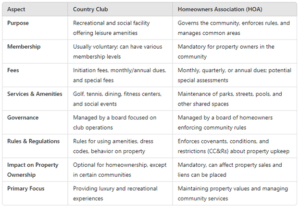
There are many differences in the operation of a country club community compared to those of a homeowners association. Choosing where to live can significantly impact your lifestyle. Understanding the nuances between these two is important as each offers unique advantages, amenities, and governance styles that cater to different preferences and priorities.
Operational Structure
HOAs: A homeowners association’s primary purpose is to enforce community rules, manage common property, and maintain the neighborhood. HOAs generally fall under IRS tax code 528, which governs homeowners associations for federal tax purposes. Under Section 528, HOAs may qualify as tax-exempt organizations, provided they meet specific criteria related to their operations and income.
Country Clubs: A country club does not have the same purpose of rule enforcement and community management as HOAs do. Country clubs typically operate under Internal Revenue Code Section 501(c)(7), which is designated for social and recreational clubs. This allows them to function as nonprofit entities while focusing on member services.
Management Structure
HOAs: Most homeowners association’s contract with professional management companies to handle day-to-day operations, which include property management, financial oversight, and administrative tasks. These companies generally charge a flat monthly fee that covers their services and labor costs. Additionally, there may be extra charges for specific services such as legal consultations or special project management.
Country Clubs: Country clubs are typically self-run organizations. Their staff is compensated through structured salaries and wages, much like other hospitality and service-oriented businesses. This payment structure can vary based on the club’s size, the complexity of its operations, and the specific roles of staff members.
Service Standards
HOAs: A homeowners association’s main goal is to preserve the community’s property values and ensure that residents have access to basic amenities and services. To accomplish this goal, HOAs monitor the community for necessary maintenance and enforce community rules. While staff may receive training in property management and maintenance, the emphasis on hospitality may not be as pronounced as in country clubs.
Country Clubs: The primary focus of a country club is on providing premium, member-centric services that enhance the recreational and social experiences of its members. This includes dining, events, sports activities, and personalized services. Staff members, including waitstaff, golf pros, and management, are often trained to deliver high levels of customer service, with a strong emphasis on hospitality and member engagement.
Listed below are some additional differences in how Country Clubs and HOAs operate:

